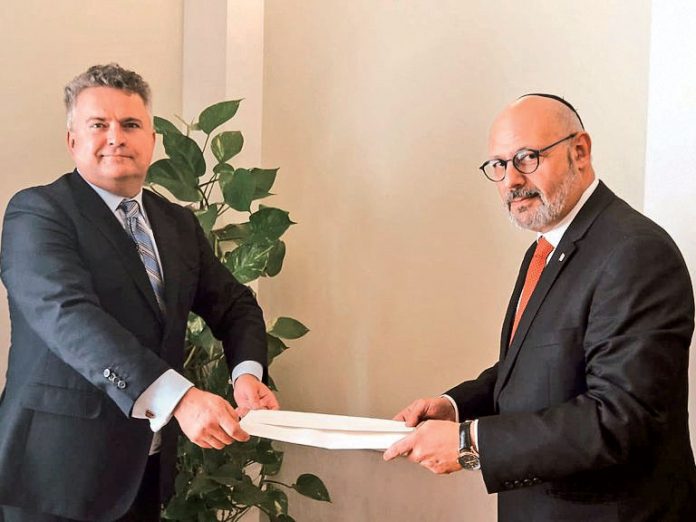“I feel like I’m the representative of Medinat Yisrael, am Yisrael and Torat Yisrael,” Joel Lion tells me during our recent conversation about his appointment as Israel’s new ambassador to Ukraine. “That’s what I believe Hakadosh Baruch Hu wants me to do.”
And how is he managing with kashrut?
“It’s really easy,” he informs me amiably. “The city of Dnepropetrovsk has a nice kosher supermarket and Chabad shechitah. And even in the regular supermarkets in Kiev, where I live, you can get a lot of kosher products from Israel like techinah. They also sell a lot of food with the OU hechsher.”
Joel, a foodie who has received accolades from Israel’s Foreign Ministry for his cooking skills, was on Ukrainian TV earlier in the day, in a segment in which he demonstrated how to cook shakshuka before a national audience. Without making a big fuss about it, he’d brought his own dishes and cutlery down to the television studio so that the food would be 100% kosher. When I asked him why this was necessary, he explains that that’s how these kinds of shows work: you cook the food, and then you sit down with the host and eat it. “The other reason,” he adds hastily, “is that I’m a Yekke, so if I’m doing something, I have to do it right; there’s no such thing as compromise. I’m a 22nd-generation descendent of the Maharil, who compiled the minhagei Ashkenaz and is buried in Worms. Yekkes are very firm about keeping Torah and mitzvos while also participating in the world at large. That was the way of my rabbanim, Rav Shamshon Raphael Hirsch and Rav Weinberg, the Seridei Eish, and others.”
“Why shakshuka?” I ask him out of curiosity.
“Shakshuka is like the ingathering of the exiles,” he says with an easy laugh. “It’s about taking a bunch of random ingredients, throwing them into a pan and mixing them up until you can’t see any difference between them. While I was cooking, I was simultaneously explaining to the host what it means to check the eggs for blood spots and why I’d brought everything from home. I think it’s very important to explain all these things, because it’s possible that some Jews were watching the program, and it might make them think about keeping kosher.”
“You’re demonstrating that it’s possible to be a diplomat and an Orthodox Jew at the same time,” I tell him. But he insists that the Israeli government deserves some of the credit.
“They were very helpful in providing me with everything I needed as a religious Jew. For example, I needed mezuzos for the ambassador’s residence, which is really quite nice, and they got them for me from a very reliable sofer. I also needed new dishes and had to bring them to the mikvah, and they took care of everything.”
“The kitchen probably had to be kashered too,” I muse.
“Of course. We kashered the whole kitchen and threw away all of the old pots and pans and dishes. The new sets had to be imported from Israel because they’re specially made with the emblem of the State of Israel. We got the meat dishes with the emblem in gold, and the dairy dishes with the emblem in silver. When it came to toiveling everything I was helped by Chabad, but it wasn’t free of charge so the Israeli government paid for that as well. To me, this is symbolic of the significant change that’s occurred in Israel over the past few years. I don’t know if they would have been so accommodating 20 years ago. In general, the atmosphere has become much more traditional. I can even see it in the people who work at the embassy; as soon as I arrived they asked me if I’d be making Shabbos meals so they could be invited because they wanted to hear Kiddush. I’m looking for a cook, by the way, if you know of anyone.”





















